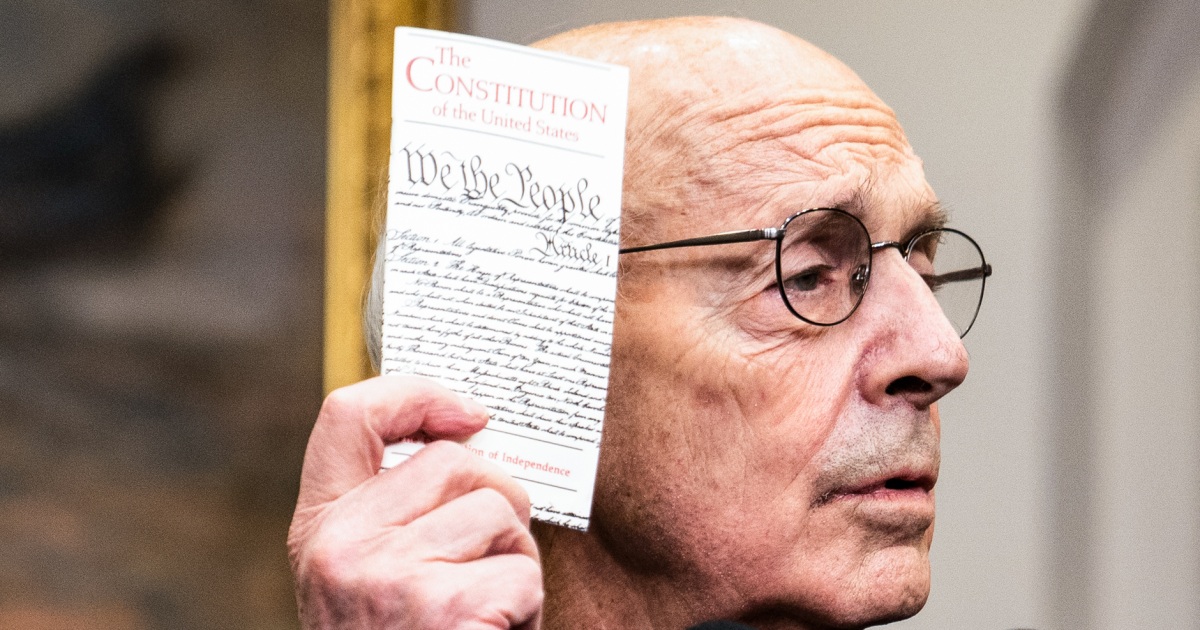What retired justice Stephen Breyer’s new essay gets wrong about ‘civility’

United States
Breaking News:
Washington DC
Sunday, May 19, 2024


The public’s trust in the Supreme Court has plummeted, as the conservative supermajority decisions have already stripped Americans of rights and threaten more of the same. But in a new essay published Wednesday in The New York Times, former Supreme Court Justice Stephen Breyer suggests a more pressing concern for the high court and the country: Are the justices friends?
For all Breyer’s anecdotes, the core of his essay is still emphasizing the humanity of justices who are more than willing to de-emphasize the humanity of others in their decisions.
Breyer suggests that differences of opinion between the justices, “important as they are,” must “remain professional, not personal.” This was the case while he was a justice, he writes, and “this meant that we could listen to one another, which increased the chances of agreement or compromise.” Such congeniality is a template for a divided nation, Breyer argues — without going into detail about the actual disagreements between the left and the right on matters like race, gun safety and voting rights.
The retired justice’s piece is filled with anecdotes about the various justices he served alongside ribbing each other and finding connection despite their policy differences. It would all be charming — if it weren’t for the obscene amounts of power those nine justices wield, no matter how chummily they do it. Instead, the sentiment of Breyer’s writing manages to combine that of a disgruntled retiree’s sepia-tinged remembrances and an overly earnest Facebook post. For all Breyer’s anecdotes, the core of his essay is still emphasizing the humanity of justices who are more than willing to de-emphasize the humanity of others in their decisions.
In a sense, this is nothing new for the former justice. It hearkens back to his former traveling debate with the late Justice Antonin Scalia, a lion of the conservative originalist movement in the courts. It was their way of demonstrating that strenuous debate over the law doesn’t equate to being enemies who use political calculations in their rulings. “Judges make terrible politicians,” Breyer told a Senate hearing back in 2011 alongside Scalia, arguing that there was little room for making political calculations in their rulings. “We have to make decisions based on reason. That’s it.”
It’s a sentiment that was worthy of a side-eye even at the time, and has only gotten less convincing as the court’s composition has shifted away from the center. Placing civility and agreeability over differing views is a hallmark of the centrist line of thought, using the appearance of goodwill to disguise the depth of division between two positions. Politics is the art of being able to determine the law, and the law is the codified result of a society’s politics. That is never more the case than when decisions of vast importance before the Supreme Court are decided based almost entirely on the political considerations of the justices in the majority.
The gulf between Breyer’s hopes and reality was on display in the momentous 2022 decision to overturn Roe v. Wade’s abortion protections.
The gulf between Breyer’s hopes and reality was on display in the momentous 2022 decision to overturn Roe v. Wade’s abortion protections. In a Times article from this past December on the behind-the-scenes maneuvering ahead of that opinion, Breyer is described as someone who “was sometimes dismissed by other liberals as an overly optimistic institutionalist who underestimated the ambitions of the conservative majority.” It emphasized though his “strong ties with justices on the right” that he hoped could be used to find some kind of consensus on the Dobbs case.
He was deeply mistaken. Unlike the Casey decision in 1992, there was no consensus that could be forged when the end goal — striking down Roe — was predetermined before the court had heard a single word of the oral arguments. It didn’t matter how many hockey games they’d attended together, or rounds of golf had been played among them. The callous disregard from the majority for the people its decisions affect makes it hard for Chief Justice John Roberts’ complaints about criticisms of the court to find much traction. It’s also why the recent joint appearances of Justices Amy Coney Barrett and Sonia Sotomayor to promote civil debate in the face of polarization, which Breyer’s essay praised, are sure to do little to instill greater trust in the court’s decisions.
The most generous explanation is that Breyer’s intended audience isn’t the average reader of The New York Times, but his former colleagues still serving on the bench. Even if that’s the case, I’m skeptical that reminding them of the good times they’ve shared will do much to affect the actual decisions that are made. If those pleasant memories couldn’t sway his conservative colleagues when Breyer was actually voting on opinions, there’s little reason for them to listen to him now.